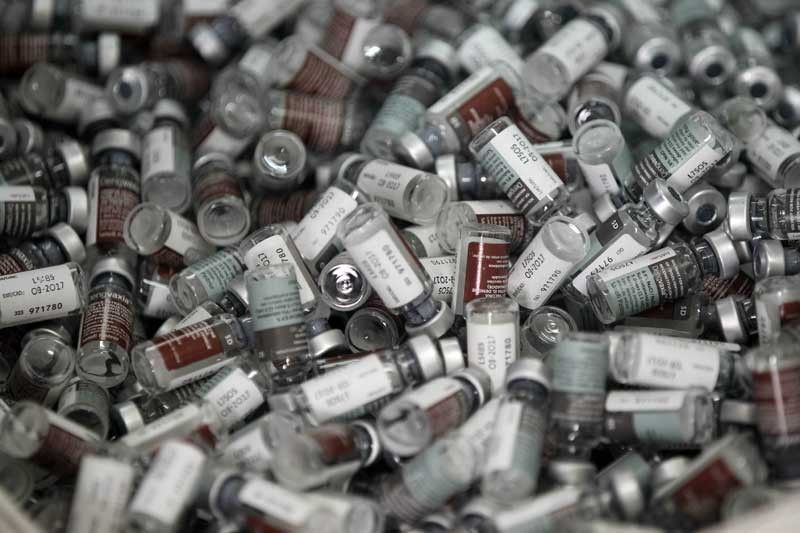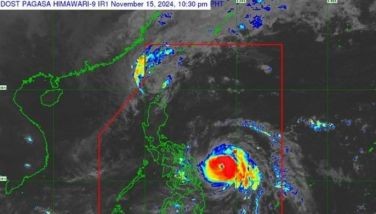Senators oppose use of Dengvaxia

MANILA, Philippines — Senators warned yesterday against proposals for the government to allow the use of the controversial Dengvaxia vaccine to help contain the dengue outbreaks in many parts of the country.
Senate President Vicente Sotto III said questions on the efficacy of Dengvaxia –manufactured and tested in the Philippines by the French pharmaceutical giant Sanofi-Pasteur – remain unresolved.
“If it was not effective before, how can it be effective now?” Sotto said. “It’s not that I’m not amenable, we all want protection from or cure for dengue, but there is uncertainty in the product.”
For him, the government must await the recommendations on the use of Dengvaxia before making any decision.
Sen. Richard Gordon, chairman of the Blue Ribbon committee that investigated the Dengvaxia controversy in the 17th Congress, said releasing the vaccine to the market for use would be a “catastrophic step in the wrong direction.”
He said when the committee probed the P3.5-billion procurement of the vaccines in 2016, the senators found “a lot of ethical things happening,” including meetings between then president Benigno Aquino III and former health secretary Janet Garin with Sanofi-Pasteur executives.
Gordon revealed that he wrote a letter to Health Secretary Francisco Duque III two weeks ago requesting him to check on whether those inoculated with the vaccine got sick again with dengue.
‘Estoppel’
Health education and disease prevention expert Anthony Leachon also warned that those pushing for the use of Dengvaxia could just be attempting to impel estoppel to the government and the victims in the pending criminal cases.
Allowing the vaccine in the market again could also exonerate those accused in the Dengvaxia controversy.
Leachon said the medical profile of the thousands of children inoculated with Dengvaxia in 2016 must first be carefully reviewed as part of the standard practice of “post-marketing surveillance” or monitoring the safety of a new drug or medical device.
For him, the eradication of the breeding places of mosquitoes and the massive cleanup of schools, work places and communities remain to be the most effective counter-measure to dengue.
Buhay party-list Rep. Lito Atienza also urged the government to go slow on allowing Dengvaxia to be redistributed to the Philippine market.
“Let us not allow ourselves to be stampeded into embarking on another round of Dengvaxia vaccinations due to the rising number of cases, now estimated at over 100,000. In fact, now is the best time to find out whether the forced vaccination done in the past is the cause of this upsurge, or if it is safe and effective, as claimed by those who implemented the program,” said Atienza.
For him, the DOH “should first determine if many of those infected with dengue now had been vaccinated with Dengvaxia in the past.”
“If they had indeed been vaccinated before, then this clearly shows that the vaccine is not safe and is in fact causing this problem now. On the other hand, if it is determined that most of the victims today have not been vaccinated, then it is time to also clear those falsely suspected of causing the problem,” he added.
He noted that Garin and Aquino were among the former officials who have been blamed for the deaths. Aquino had repeatedly defended his decision to authorize the vaccination, saying he had to do it given the increase in dengue cases in many parts of the country.
The Dengvaxia vaccination program targeted one million schoolchildren in at least five regions.
Medical experts later said it should have been limited to fewer children since the vaccine was still then newly developed and had not yet been proven to be effective on a massive scale.
“They should be charged and jailed if they were at fault but cleared if they were not,” Atienza said, adding that the DOH could check with hospitals and schools and their own field personnel, who should have a record of schoolchildren who received Dengvaxia shots.
Health Undersecretary Eric Domingo said that while the DOH is cool to the proposal of the Doctors for Truth and Public Welfare to lift the ban on Dengvaxia, the vaccine is “currently not registered with Food and Drug Administration (FDA)” as among those drugs permitted to be sold in the country.
“There was a permanent revocation of the Certificate of Product Registration of Dengvaxia by the FDA due to non-compliance with regulatory requirements,” he noted.
Meanwhile, the European Union (EU) will provide 100, 000 euros (about P5.68 million) in humanitarian aid to the Philippines to assist communities most affected by dengue outbreak.
The aid will, directly and indirectly, benefit 300, 000 people in some of the hardest-hit areas in the regions of Calabarzon, Central Luzon, Central Visayas, Metro Manila and Western Visayas, the EU said in a statement.
It will also support the Philippine Red Cross (PRC) in delivering crucial assistance through the strengthening of public health services, such as the establishment of dengue emergency medical units or hospital extension wards in local government hospitals and the provision of nursing staff to respond to overwhelming dengue cases.
In addition, water sources which can be mosquito breeding grounds will be cleaned and treated with a biological control agent to eliminate mosquito larvae, the statement also said. This is aside from enhancing public awareness through health promotion activities and information dissemination to prevent or reduce new cases.
The aid is part of the EU’s overall contribution to the Disaster Relief Emergency Fund (DREF) of the International Federation of Red Cross and Red Crescent Societies (IFRC).
Since the start of the year, the Philippines has seen a drastic increase in the number of dengue cases nationwide, with close to 116,000 cases, including 491 deaths, reported during the first six months.
This was an increase of 86 percent compared to the same period last year when 57,564 cases were reported.
So far, Western Visayas has been the worst hit, where nearly 16,000 cases have been registered.
Following the sharp surge in dengue cases, the Department of Health (DOH) declared a national dengue alert on July 15 to step up surveillance and response to the mosquito-borne disease.
Also, the Philippine Charity Sweepstakes Office (PCSO) donated yesterday P10 million to the Philippine Red Cross (PRC) for its Dengue Calamity Fund.
In formal turnover ceremonies, PCSO general manager Royina Garma said the donation aims to provide safe blood to hospitals that are treating dengue cases.
“Together, we are partners in ensuring safe blood for those affected with dengue virus,” Garma said at a press conference with PRC chairman Sen. Richard Gordon.
Garma stressed the increased need for safe and accessible blood at this time.
“Without all of you (blood donors), we will not be able to supply majority of blood needs in the country,” she said.
Gordon, for his part, expressed his gratitude to blood donors who help the PRC ensure accessible, safe and affordable blood supplies for Filipinos.
“Be proud of yourself. You give your blood even if you don’t know who will get it. You are our go-to people and you do your job for the suffering humanity. You are the lifeline of the people,” Gordon said. – With Jess Diaz, Helen Flores, Sheila Crisostomo, Rainier Allan Ronda
- Latest
- Trending




























